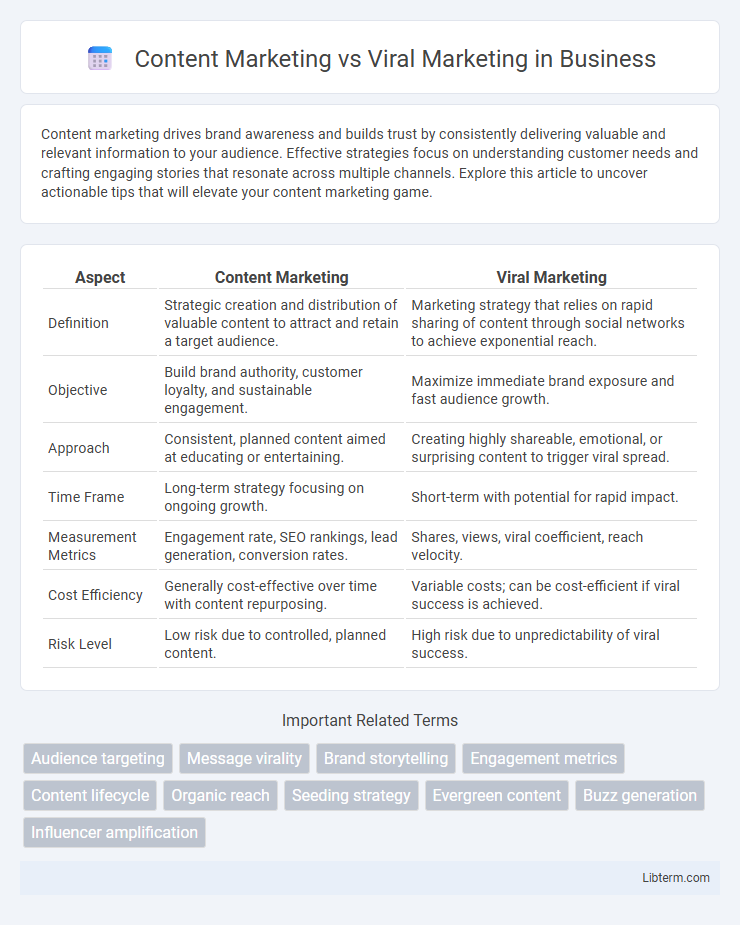Content marketing drives brand awareness and builds trust by consistently delivering valuable and relevant information to your audience. Effective strategies focus on understanding customer needs and crafting engaging stories that resonate across multiple channels. Explore this article to uncover actionable tips that will elevate your content marketing game.
Table of Comparison
| Aspect | Content Marketing | Viral Marketing |
|---|---|---|
| Definition | Strategic creation and distribution of valuable content to attract and retain a target audience. | Marketing strategy that relies on rapid sharing of content through social networks to achieve exponential reach. |
| Objective | Build brand authority, customer loyalty, and sustainable engagement. | Maximize immediate brand exposure and fast audience growth. |
| Approach | Consistent, planned content aimed at educating or entertaining. | Creating highly shareable, emotional, or surprising content to trigger viral spread. |
| Time Frame | Long-term strategy focusing on ongoing growth. | Short-term with potential for rapid impact. |
| Measurement Metrics | Engagement rate, SEO rankings, lead generation, conversion rates. | Shares, views, viral coefficient, reach velocity. |
| Cost Efficiency | Generally cost-effective over time with content repurposing. | Variable costs; can be cost-efficient if viral success is achieved. |
| Risk Level | Low risk due to controlled, planned content. | High risk due to unpredictability of viral success. |
Understanding Content Marketing
Content marketing focuses on creating valuable, relevant, and consistent content to attract and engage a clearly defined audience, aiming to build long-term relationships and drive profitable customer actions. It relies on strategies such as blog posts, videos, infographics, and social media updates that provide useful information or entertainment without overtly promoting products. Understanding content marketing involves recognizing its role in nurturing leads, improving brand authority, and supporting SEO efforts by delivering content tailored to audience needs and search intent.
Defining Viral Marketing
Viral marketing is a strategy that leverages social networks and online sharing to generate rapid, exponential exposure for content, products, or brands. It relies on creating highly engaging, shareable content that motivates users to spread the message organically across digital platforms. Unlike content marketing's steady and value-driven approach, viral marketing emphasizes quick bursts of attention and widespread reach through compelling, often emotionally charged media.
Key Objectives: Content vs Viral Marketing
Content marketing aims to build long-term brand authority, engage target audiences, and nurture customer relationships through valuable, relevant content. Viral marketing focuses on rapid, widespread brand awareness and user engagement by encouraging sharing and creating highly shareable, emotionally impactful campaigns. The primary objective of content marketing is sustained audience growth and trust, while viral marketing seeks immediate, large-scale visibility and buzz.
Strategies and Tactics Compared
Content marketing focuses on creating valuable, relevant, and consistent content to attract and retain a clearly defined audience, utilizing strategies such as blog posts, videos, and social media engagement to build long-term brand loyalty. Viral marketing employs tactics designed to encourage rapid sharing and exponential reach, often leveraging emotional triggers, influencer partnerships, and shareable, attention-grabbing content to maximize short-term visibility. Both strategies require tailored targeting and data analysis, but content marketing aims for sustained growth while viral marketing prioritizes immediate impact.
Audience Engagement Differences
Content marketing builds long-term audience engagement by creating valuable, relevant, and consistent content tailored to target demographics, fostering loyalty and trust. Viral marketing relies on rapid, widespread sharing of highly shareable content designed to capture immediate attention and provoke emotional responses, often resulting in short-term spikes in engagement. Unlike viral marketing's unpredictable reach, content marketing sustains ongoing interaction and relationship-building with the audience through strategic storytelling and informative messaging.
Measuring Success: Metrics and KPIs
Measuring success in content marketing relies on metrics such as organic traffic, engagement rates, conversion rates, and SEO rankings to evaluate long-term audience growth and brand authority. Viral marketing success is often quantified by rapid reach metrics including share velocity, social media mentions, video views, and the number of user-generated shares within a short timeframe. Key performance indicators (KPIs) for content marketing focus on sustained engagement and lead generation, whereas viral marketing KPIs emphasize immediate impact and message amplification.
Pros and Cons of Content Marketing
Content marketing builds long-term brand authority through consistent, valuable content that attracts and retains a targeted audience, boosting SEO and customer loyalty. However, it requires significant time and resources to produce quality material and may yield slower results compared to viral marketing's rapid but unpredictable reach. While content marketing ensures sustainable engagement and measurable ROI, it can struggle to generate immediate widespread awareness or sudden spikes in traffic.
Pros and Cons of Viral Marketing
Viral marketing rapidly amplifies brand awareness through shareable content, often generating massive reach with minimal budget, but its success is unpredictable and short-lived. It can create significant buzz and engagement, yet lacks control over the message and may lead to negative publicity if poorly managed. Brands relying solely on viral marketing risk inconsistent results without the sustained impact provided by strategic content marketing efforts.
When to Use Each Approach
Content marketing is ideal for building long-term brand authority and nurturing customer relationships through consistent, valuable information tailored to the target audience. Viral marketing excels when aiming for rapid, widespread exposure with shareable, emotionally engaging campaigns that generate significant short-term buzz. Choose content marketing for sustained audience engagement and viral marketing for quick spikes in brand awareness and social sharing.
Integrating Content and Viral Marketing
Integrating content marketing and viral marketing amplifies brand reach by combining strategic storytelling with shareable, emotionally engaging content designed to trigger rapid audience growth. High-quality, targeted content serves as the foundation while viral elements such as humor, novelty, or controversy stimulate organic sharing across social media platforms. This synergy enhances SEO performance, boosts user engagement, and accelerates lead generation through scalable and measurable campaigns.
Content Marketing Infographic

 libterm.com
libterm.com